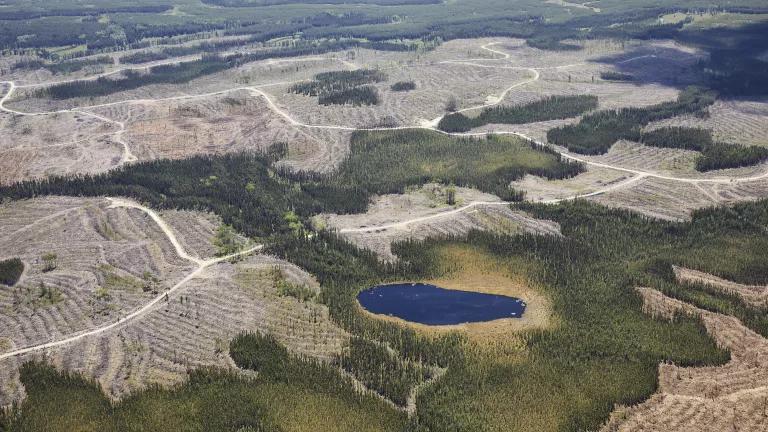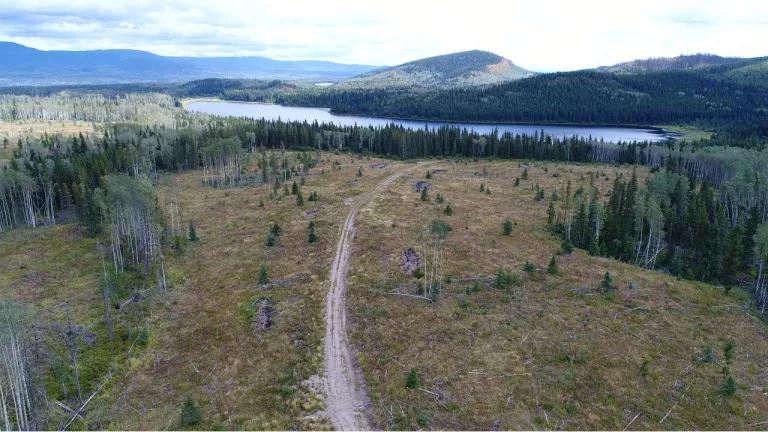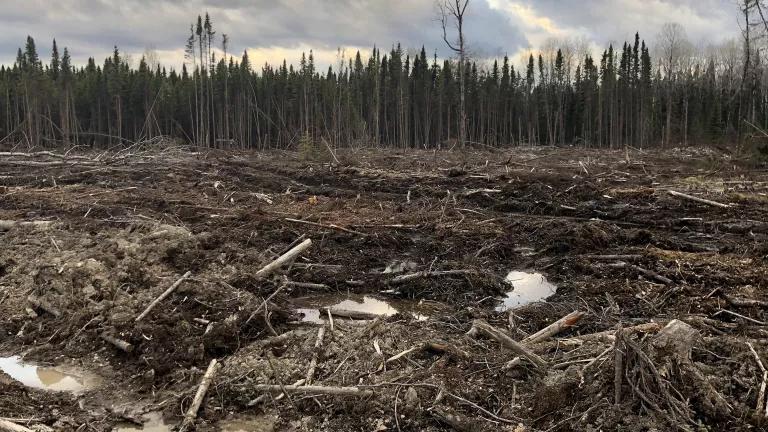
Clearcut logging in Ontario
As Canada prepares to take center stage at the UN biodiversity conference in Montreal, in what could have been a hero moment, the Trudeau government is instead solidifying its role as an antagonist to global efforts to protect our forests. With Canada’s recent efforts to undermine progress on forest protection internationally and continued entrenchment in regressive forest policies domestically, Canada will walk into the negotiating room with little more than a tree planting program to hold up against its continued destruction of irreplaceable primary forests, broken forest carbon accounting system, and longstanding record of obstructionism to international efforts to protect northern forests.
For years, Canada’s desire for environmental leadership has conflicted with its fidelity to unsustainable industrial logging. Two years ago, even as leading Canadian officials called for the international community to protect intact forests, others in the Trudeau government were lobbying against the boreal forest’s inclusion in landmark legislation in California and New York to address unsustainable forest product procurement practices and enshrine protections for Indigenous rights. Canada was the only nation to oppose the policies, and was successful in the boreal’s removal from the California bill.
Now, just days before the start of the Convention on Biological Diversity’s 15th Conference of the Parties (COP15), Canada has again reached outside its own borders to undermine other governments’ measures to protect boreal and temperate forests in the Global North, some of the most vital ecosystems to averting climate catastrophe and preserving global biodiversity.
In a letter to EU policymakers, Canada’s ambassador advocates for stripping key provisions from the bill that would implement long-overdue protections for boreal and temperate forests in the Global North. While claiming to “support the objectives” of the EU bill, the Government of Canada is attempting to scale back the scope of the forest commodities covered under the bill and to entirely remove one of the regulation’s most central features: its restrictions on products tied to forest degradation, which includes the industrial logging of climate-critical primary boreal forests.
Canada’s advocacy for stripping degradation from the EU bill is, like its opposition to the New York and California legislation, a call for continued impunity for the Global North’s industrial logging. For years, the Global North has avoided accountability for its own forest impacts through exploiting the narrow definition of “deforestation,” which applies only to the conversion of a forest to another land use, like agriculture or cattle ranching. Industrial logging, which aims to regrow the trees for another round of cuts decades later, ostensibly “keeps the forest a forest”--even when the clearcut forest is irreplaceable.
As a result, even though industrial logging in the Global North is the single largest driver of tree cover loss in the world, it’s been invisible in international policymaking. Canada can boast near-zero deforestation, even while clearcutting more than 1.3 million acres of forest, much of this in never-before-logged primary forests essential to the climate and biodiversity. It can claim to be a “world leader on forest management,” while ranking third globally in intact forest landscape loss and tree cover loss, behind only Russia and Brazil.
While Canada’s opposition to the legislation in New York and California attempted to claim that the term “degradation” does not apply in Canada, that position has become increasingly untenable given recent warnings from scientists about the toll of Canada’s continued impact on primary forests. Instead, in a well-worn denalist tactic, Canada’s now insisting that the term “degradation” has no universally recognized definition and therefore isn’t yet a workable element of EU policy. However, scientists have been clear that the term, which does have internationally recognized definitions, at a minimum encompasses industrial logging in primary forests, providing a clear starting point for policies targeting degradation.
Perhaps even more alarmingly, Canada’s casting doubt on the workability of a “forest degradation” standard when, for more than a year, it’s been a signatory to the Glasgow Leaders’ Declaration on Forests and Land Use–which commits countries to ending and reversing deforestation and land degradation by 2030. If Canada is simultaneously working to undermine the same measures it’s committed to supporting, it shatters the country’s credibility as an honest broker on international environmental agreements. As Canada magnanimously supports efforts to stem tropical deforestation under the Glasgow Declaration, it seems to want to erase its own domestic forest protection responsibilities enshrined in the agreement.
COP15 also comes at the end of a particularly bleak year for Canada’s approach to its domestic forest policy, from failure to take action to protect boreal caribou to advancing a misguided offsets policy. A recent report from NRDC and Nature Canada highlighted that industrial logging is responsible for more than 10 percent of Canada’s overall greenhouse gas emissions, placing the sector on par with the impact of tar sands production. Yet, the Trudeau government continues to cling to accounting sleights of hand dating back to the Conservative Harper government that effectively write off these emissions, making the industry appear to have little to no climate footprint. The government’s response to the NRDC and Nature Canada report has leaned on misrepresentations of international carbon accounting rules, attempted to justify giving the logging industry credit for the forests they do not cut, and–as always–pointed to tree planting as a hallmark of forest leadership.
All this has left Canada clinging to a slow-to-start tree planting program as the centerpiece of its “leading” forest policy agenda and mired the Trudeau government in a new kind of climate denial.
Biodiversity’s fate isn’t just tethered to far-flung forests in the tropics. It’s also being written just a few hours’ drive from where the delegates will meet in Montreal, in the tracks of bulldozers and in beheaded stumps. COP15 will be a moment of reckoning for the Trudeau government–and an opportunity to finally change course. Canada needs to acknowledge that primary and mature forests are too vital to send to a fate as toilet paper and 2x4’s and that economic health doesn’t have to come at the expense of forests’. At COP15, Canada can finally shed its growing reputation for obstructionism and champion the development of a strong Global Biodiversity Framework that will set the stage for the next critical decade for our forests and the future of our planet.



